Want a board that can take a beating and still look gorgeous? End-grain butcher blocks are your move.
The “checkerboard” surface is kinder to knives, self-heals from cuts, and stays put while you chop.
I tested seven end-grain boards on Amazon for stability, cleanup, and long-term durability.
Here are the ones I’d trust for weeknight prep and holiday carving—without trashing your edges.
XINZUO Large End Grain Acacia Cutting Board
This one’s basically the tank of wooden cutting boards — thick, heavy, and built to outlive half the gadgets in your kitchen.
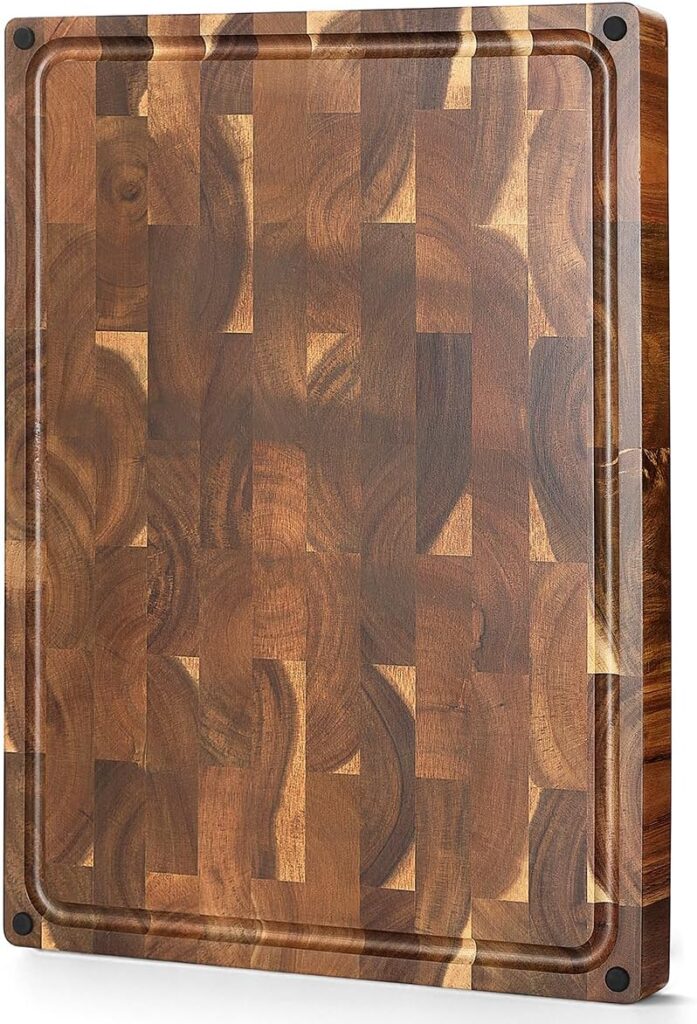
Why This Board Goes Hard
- Thick 1.5” End-Grain Build — Self-healing, gentle on knives, ultra-durable.
- High-Density Acacia — Warp-resistant, high-heat-tolerant, long-lasting.
- Built-In Juice Groove — Keeps runaway juices under control.
- Hidden Handles + Non-Slip Feet — Easy to move, impossible to slide.
- Reversible Design — One side for raw meats, the other for ready-to-eat. Hygiene unlocked.
EcoDecors FSC-Certified Teak End Grain Board (20” x 15”)
The bougie one. Sustainable, massive, and honestly gorgeous. PLUS built-in charcuterie trays?
This is host-mode activated.

Why This Board Is a Showstopper
- 100% FSC-Certified Teak — Moisture-resistant, premium, eco-friendly.
- Reversible w/ 3 Charcuterie Trays — Prep on one side, serve snacks on the other.
- End-Grain Construction — Soft on knives and built to last.
- Large Working Surface — 20×15 inches of slicing real estate.
- Food-Safe Triple Finish — Moisture, stain, and odor resistant.
Ziruma End Grain Acacia Butcher Block (16” x 11”)
Aesthetic. Durable. Pre-seasoned.
This Ziruma end-grain board is for people who want that luxury look without the luxury headache.
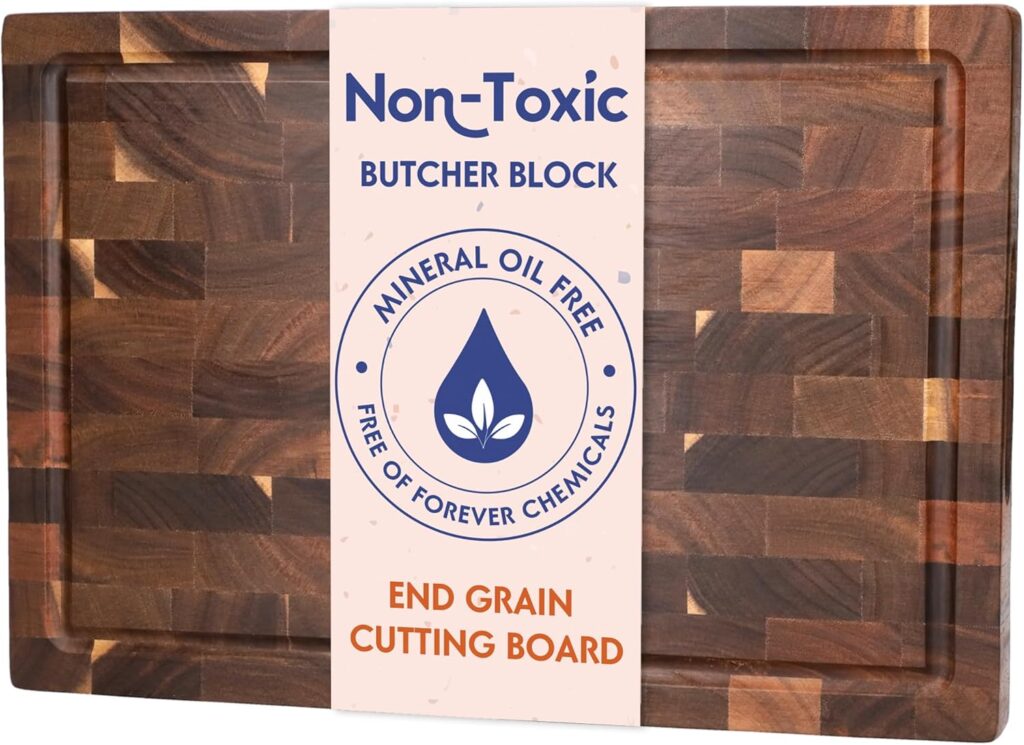
What Makes It Special
- 100% Natural Acacia (No Toxins) — No BPA, no mineral oils, no weird chemicals.
- End-Grain Self-Healing Surface — Knife marks close up, board stays pretty.
- 1.5” Thick Heavy-Duty Build — Designed for serious chopping and carving.
- Pre-Conditioned — Beeswax + flaxseed + lemon oil finish, plus extra wax included.
- Juice Groove + Carry Handles — Practical + polished = yes please.
John Boos Maple End-Grain Reversible Block
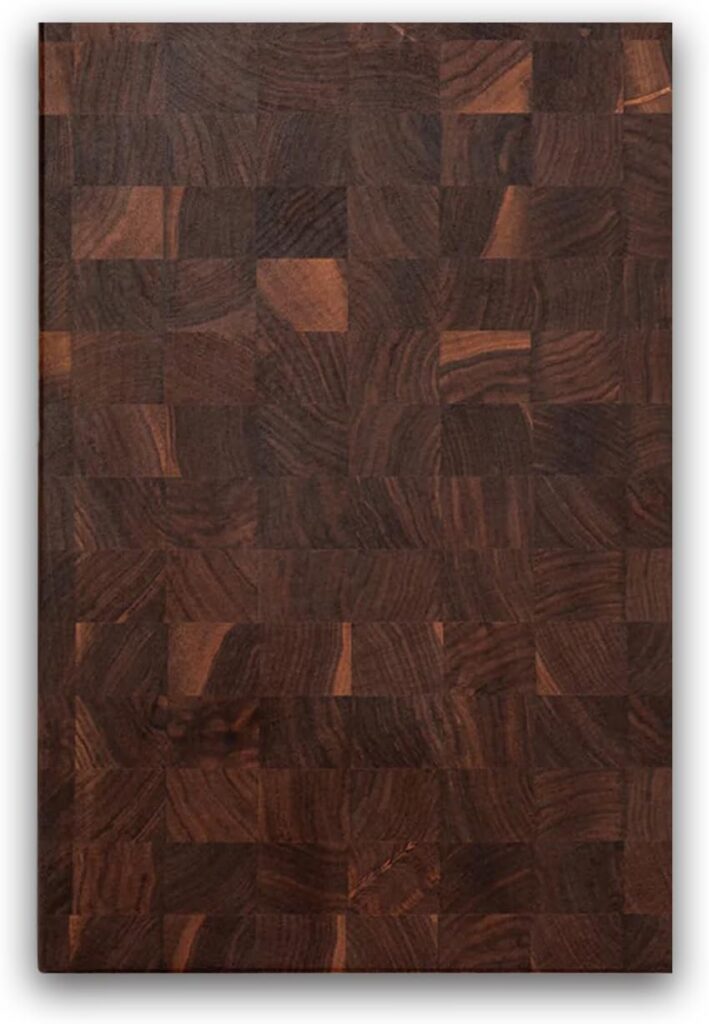
- Wood: Hard rock maple (NSF-grade)
- Size/Thickness: 18″ x 18″ x 3″
- Features: Reversible, finger grips, hand-oiled finish
Why I like it: The Boos block is the classic for a reason—**super stable, gentle on knives, and built to last decades** with basic oiling. It doubles as a carving station and a daily-prep beast.
Teakhaus End-Grain Teak Cutting Board
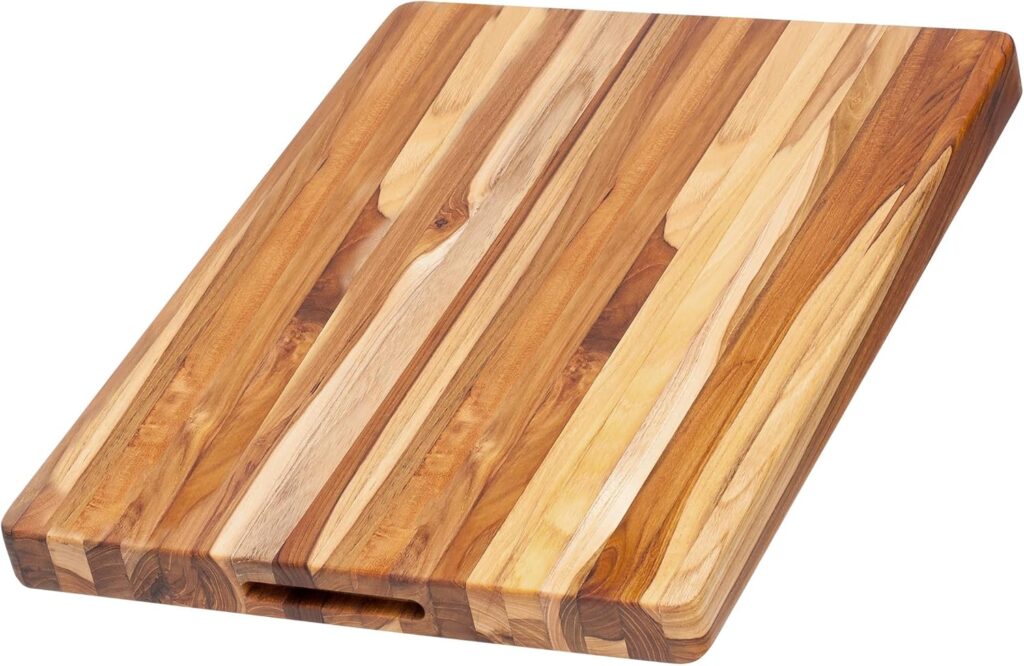
- Wood: Sustainable teak (naturally oil-rich)
- Sizes: Commonly 20″ x 15″ x 1.5″ (varies by model)
- Features: Hand grips, water-resistant grain
Why I like it: Teak’s natural oils help resist moisture and stains. It’s a touch lighter than mega-thick blocks and looks stunning on the counter.
Ironwood Gourmet End-Grain Acacia Butcher Block
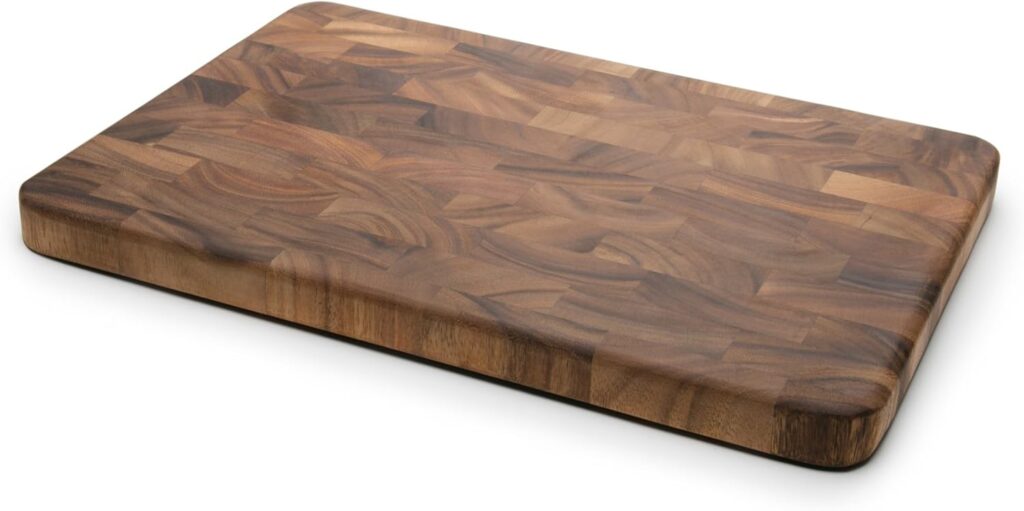
- Wood: Acacia (durable, rich grain)
- Size/Thickness: Often ~14″–20″ wide, 1.5″–2″ thick
- Features: Finger grips, pre-oiled finish
Why I like it: Handsome acacia patterning hides knife marks well. It’s sturdy without feeling like a kettlebell when you clean it.
Sonder Los Angeles End-Grain Walnut Board
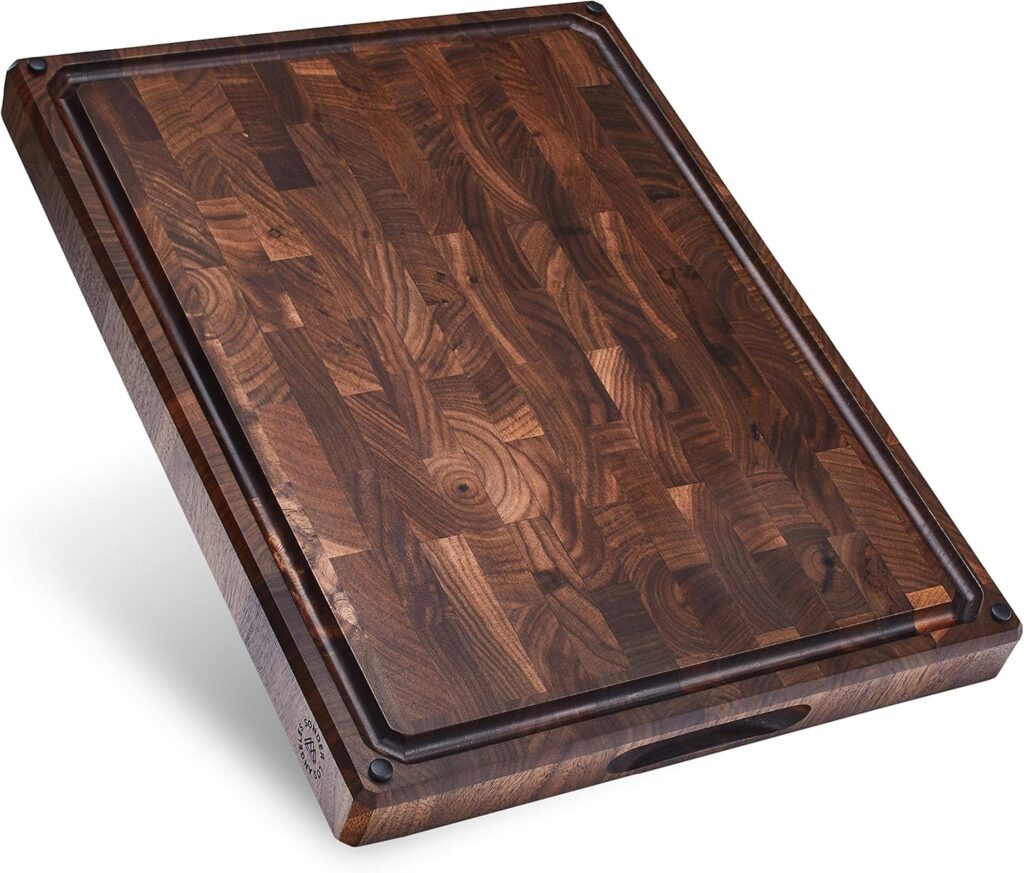
- Wood: American walnut (dark & classy)
- Size: Common ~17″ x 13″ x 1.25″
- Features: Deep juice groove, inset snack/cracker well
Why I like it: Entertaining-ready. The built-in well holds garnishes or crackers, and the **groove catches roast juices** like a champ.
SHUMARU Mahogany End-Grain Cutting Board
When chopping feels more like art than meal prep, you know you’re using a SHUMARU.
Crafted in Bali, this mahogany end-grain butcher block is the definition of functional beauty.
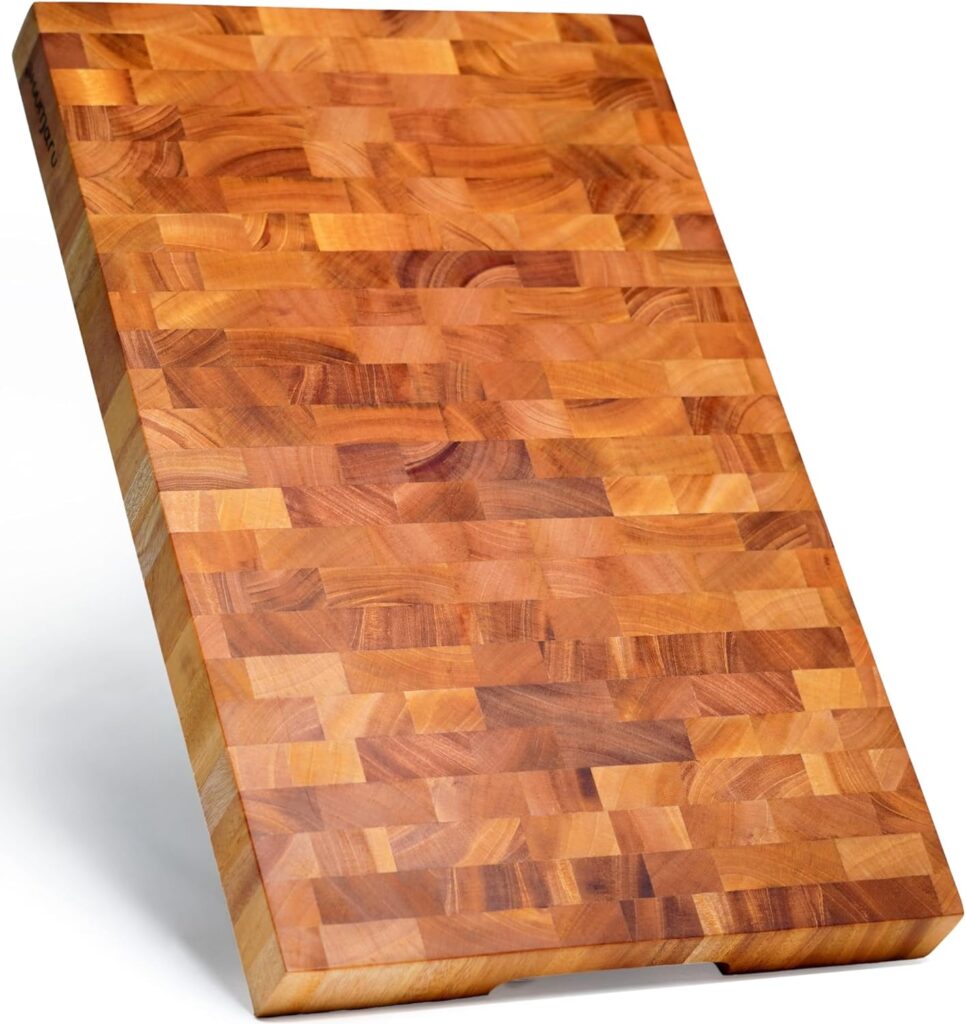
✅ Handcrafted in Bali: Each board is artisan-made from sustainably sourced mahogany — no two pieces are alike.
✅ Triple-Sanded Finish: Hand-sanded three times for that silky-smooth, knife-friendly surface that self-heals from minor cuts.
✅ Generous Workspace: Flat, full cutting area with ergonomic finger grips for easy handling and serving.
✅ Non-Slip Rubber Feet: Keeps your board steady and airflow fresh — no sliding around or moisture buildup.
✅ Eco-Friendly & Food Safe: Treated only with natural, food-grade oils — safe for you and the planet.
✅ Gift-Worthy Design: A chef-level board that looks stunning enough to gift (and comes with a 1-year replacement warranty).
Why You’ll Love It:
This isn’t just a cutting board — it’s a statement piece. Every slice, chop, and serve feels smoother, cleaner, and more refined.
Mevell Walnut Wood Cutting Board
If you’re the type who appreciates craftsmanship (and hates plastic cutting boards that warp in a month), this Mevell Walnut Wood Cutting Board is your kitchen’s new flex.
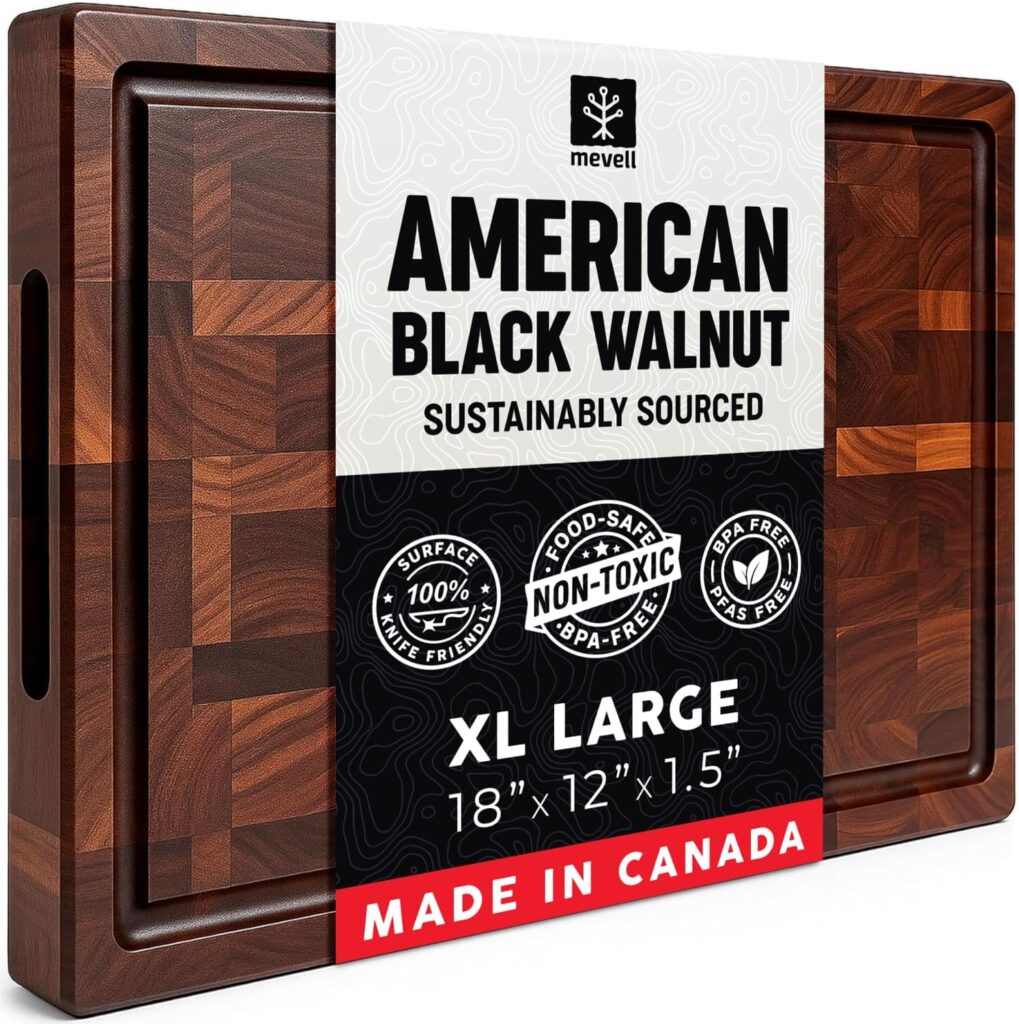
✅ Handmade in Canada: Crafted from sustainably sourced American black walnut — it’s durable, elegant, and built to last.
✅ Reversible Design: One side for carving juicy steaks, the other for chopping veggies or serving cheese — total multitasker vibes.
✅ Knife-Friendly Surface: Gentle on blades so your knives stay sharp longer.
✅ Ready to Use: Pre-seasoned with a blend of natural oils and beeswax — no prep needed.
✅ Eco-Conscious Choice: Every purchase plants a tree. That’s good taste and good karma.
Why You’ll Love It:
It’s more than a cutting board — it’s kitchen art. Premium walnut grain, smooth finish, and that made-in-Canada touch make every chop feel classy.
COCOBOSS Premium Acacia End Grain Cutting Board
If your old board is giving ✨barely cutting vibes✨ — this COCOBOSS end-grain acacia board is the glow-up your prep station needed.
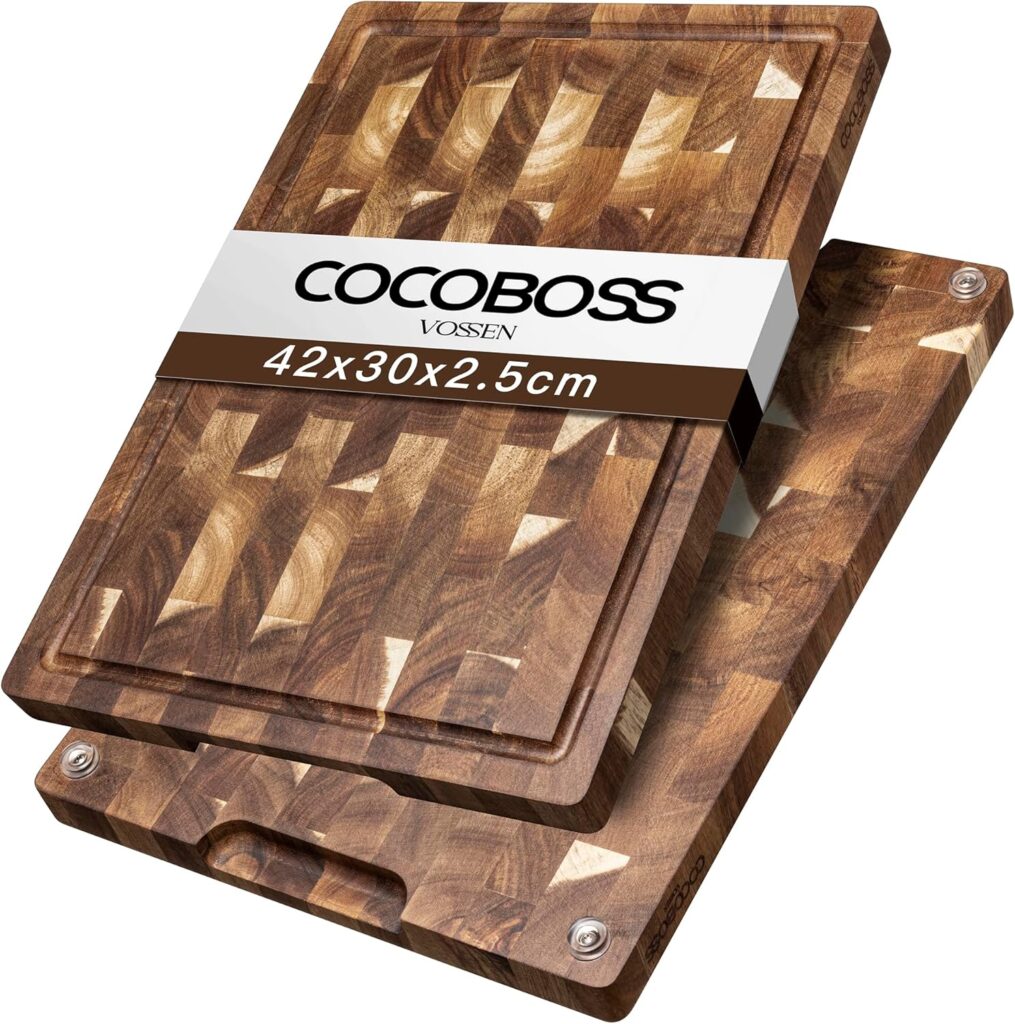
Why This Board Slaps
- End-Grain Acacia Wood — Self-healing fibers, naturally durable, knife-friendly.
- Built-In Juice Chute — Holds up to 3.5 oz of drips so your counter stays clean instead of crime-scene messy.
- Non-Slip Rubber Feet — Stays locked in place while you slice, dice, and chop like a pro.
- Easy Care — Hand wash only; oil every ~3 weeks for long-term beauty.
- Great Versatility — Perfect for meats, veggies, bread, cheese — everything.
How to Choose an End-Grain Cutting Board
End-Grain vs. Edge-/Face-Grain
End-grain shows the wood fibers upright (checkerboard). Blades slip between fibers, so the board “self-heals” and stays kinder to edges. It’s heavier and pricier—but worth it if you cook a lot.
Wood Species
- Maple: Classic butcher-block hardness; light color hides stains well with routine care.
- Teak: Naturally oily; excellent moisture resistance; medium hardness and gorgeous grain.
- Walnut: Softer feel and deep color; super gentle on knives; needs consistent oiling to keep its glow.
- Bamboo: Eco-friendly value; end-grain versions are tougher than typical bamboo boards.
Size & Thickness
For daily prep, aim for ~16″ x 12″ x 1.5″. If you carve roasts or bake a lot, step up to 18–20″ width and 2–3″ thick for serious stability.
Care & Maintenance
- Hand-wash only; dry upright. Never soak or dishwash.
- Oil monthly (or when dry) with food-grade mineral oil; finish with board wax for water resistance.
- Disinfect with diluted vinegar; sprinkle coarse salt + lemon for odors.
FAQs
Why choose end-grain over edge-grain?
End-grain boards are gentler on knives and “self-heal” because the fibers stand upright. They show fewer cut marks over time and stay looking great with basic oiling.
Which wood is best for an end-grain board?
Maple for classic butcher-block durability, teak for moisture resistance, walnut for a softer, knife-loving surface, and bamboo for eco-friendly value.
How do I maintain an end-grain board?
Hand-wash, dry upright, oil monthly with food-grade mineral oil, and apply board cream/wax as needed. Avoid soaking, dishwashers, and harsh detergents.
The Bottom Line
If your cutting board can’t handle a little chaos, it’s time for an upgrade.
These end-grain beauties aren’t just built to last — they’re built to flex. From mahogany masterpieces to maple workhorses, every board here blends form and function like a total pro.
✨ Chop smarter, not harder. Treat your knives right, keep your counters classy, and make every slice feel chef-coded. Your countertop deserves this glow-up. 💅🔪
